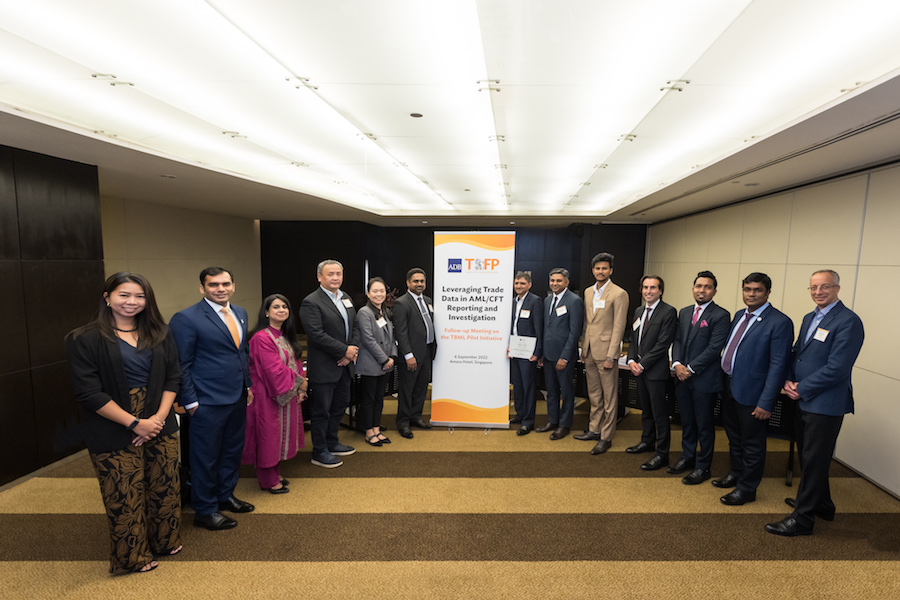Cleaning up trade finance
The early stages of a project by the Asian Development Bank (ADB) to target money laundering within trade and trade finance has already begun to show results. Catherine Daza-Estrada, senior investment officer at the ADB's Trade and Supply Chain Finance Program (TSCFP), outlines the progress of TSCFP in tackling suspicious transactions.

ADB’s Trade and Supply Chain Finance Program (TSCFP) has been working with banks, regulators, industry groups, and international organisations over the last three years to advance the capture and use of trade-related data in suspicious transaction reports (STRs), which banks must file when they encounter transactions that may be related to financial crimes such as money laundering or the financing of terrorism. The goal is to both increase the value of information contained in the STRs, leading to better enforcement, and decrease the amount of rote form-filling that produces little data of value.
TSCFP has developed a pilot project in five developing member countries – Bangladesh, Mongolia, Nepal, Pakistan and Sri Lanka – to promote the use of trade-relevant data in STRs. Trade transactions offer the opportunity to enrich STRs with significant amounts of transaction data captured in trade documents, detail that is not available in other transactions.
The pilot phase of the project is designed to demonstrate the ability of bankers to identify and capture additional data and to demonstrate the investigative and intelligence value of STRs. The pilot will concurrently advance industry practice in the reporting of STRs, potentially resulting in an expansion of trade-related data elements that will enrich STRs in future.
The United Nations Office of Drugs and Crime (UNODC) is a key partner in the effort, specifically the developers of the global anti-money-laundering software platform goAML. That platform is already used by 63 UN member states and using it as a means to capture and use trade-related data in STR filings was a natural fit. It was also an easy approach to engage multiple goAML user jurisdictions in the pilot.
“The tangible and operational results that goAML brings to member states in fighting financial crime is the core of our motivation in our work, and this ADB initiative served just that,” said Antoine Karam, Chief Software Products for Member States Information Technology Service, UNODC.
TSCFP organised multiple planning and coaching calls with the participating jurisdictions in collaboration with the goAML team in preparing for the pilot project.
TSCFP also enlisted the support of the Asian chapter of the Wolfsberg Group for a three-part webinar series that attracted over 1,500 participants, with global experts from top-tier international banks explaining how to spot trade-based money laundering, how to identify red flags, and why public-private partnerships are important for the process. That expertise was shared with financial intelligence units from developing member countries, along with law enforcement and local banks.
The webinar series led to requests to ADB to help provide further training to law enforcement agencies, the third player in investigation, supervision and compliance along with banks and regulators. That brought sharply into focus the need for credible, practical training across the region and suggested that similar opportunities to advance the fight against trade-based money laundering TBML might exist in other parts of the world.
A half-day workshop held recently in Singapore showed just how far the effort has come. Senior officials from five financial intelligence units witnessed a presentation by UNODC on the strategic direction of the goAML solution, as well as a detailed, technical question-and-answer session that addressed goAML deployment, implementation and customisation queries.

Representatives from each of the financial intelligence units presented an update on system setup and data collection efforts for the STR pilot. Those presentations were supplemented with case study content that highlighted the importance of capturing intelligence-rich trade data in STRs.
The meeting confirmed that an important benefit of the pilot project has been the relationships built up between officials of the various financial intelligence units, as well as UNODC and ADB. In addition, participating jurisdictions have noted the intention to increase engagement with customs authorities.
There are already indications based upon status updates provided through the project that reporting has increased identification of suspected trade-based money laundering transactions. This early finding aligns with expectations that volumes are currently underestimated, because trade-based money laundering is not being fully recognised by banks.
Although the pilot project is being conducted in Asia, its success can be easily replicated given the use of the goAML platform and its global reach. The principles and practices underlying the pilot, as well the objective to enhance the intelligence value of STRs can be further extended to non-goAML jurisdictions.
“Now that the trade-based money laundering features are developed and being deployed, we find it is actually the beginning of the road rather than the objective,” said UNODC’s Karam. “There is much more potential to unleash in these partnerships and we look forward to it.”





